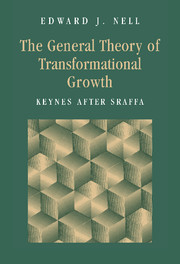Book contents
- Frontmatter
- Contents
- Preface
- Acknowledgments
- Part I History or equilibrium?
- Part II Method and approach: the active mind
- 3 Conceptual truths and empirical observations
- 4 Rationality, structure, and behavior
- Part III Money and the Golden Rule
- PART IV The wage-profit trade-off
- Part V Investment and Mass Production
- Part VI Money and fluctuations in the modern economy
- Conclusions
- Bibliography
- Index
3 - Conceptual truths and empirical observations
Published online by Cambridge University Press: 21 January 2010
- Frontmatter
- Contents
- Preface
- Acknowledgments
- Part I History or equilibrium?
- Part II Method and approach: the active mind
- 3 Conceptual truths and empirical observations
- 4 Rationality, structure, and behavior
- Part III Money and the Golden Rule
- PART IV The wage-profit trade-off
- Part V Investment and Mass Production
- Part VI Money and fluctuations in the modern economy
- Conclusions
- Bibliography
- Index
Summary
Introduction
Many contemporary economists appear to have drunk deeply from a concoction best described as a pragmatist approach to methodology, although in its “rhetorical” form it borders on the postmodern. It seems to have been considered satisfying because it apparently supports and explains conventional practices, and, as well, helps to defend at least some aspects of neo-Classical theory against competing theories and critics. But the recipe for the pragmatist brew retains important residues from earlier empiricist distillations, and may not be as digestible as it seems at first. A more satisfactory philosophical blend, while mixing in aspects of pragmatism, raises important issues for theories of market behavior.
The most convenient potion mixes Popperian falsification with Lakatos's sociological account of knowledge. This brew leads to a defense of conventional theory on the ground that it works, that is, it guides policy, and seems to be empirically satisfactory in a broad way, so that the “hard core” deserves to be protected. On the other hand, competing theories are required to meet the falsification test, since not being established, they cannot claim exemption for their “hard cores.” This they tend to fail. (The approach, however, leaves general equilibrium theory unprotected – it has no empirical content and generates no falsifiable propositions.)
A variant of this approach, likewise pragmatist, but operating with a weaker criterion of falsification, and rejecting Lakatos's sociology, holds, with John Stuart Mill, that economics is a “separate and inexact science” (Hausman, 1992).
- Type
- Chapter
- Information
- The General Theory of Transformational GrowthKeynes after Sraffa, pp. 75 - 105Publisher: Cambridge University PressPrint publication year: 1998



